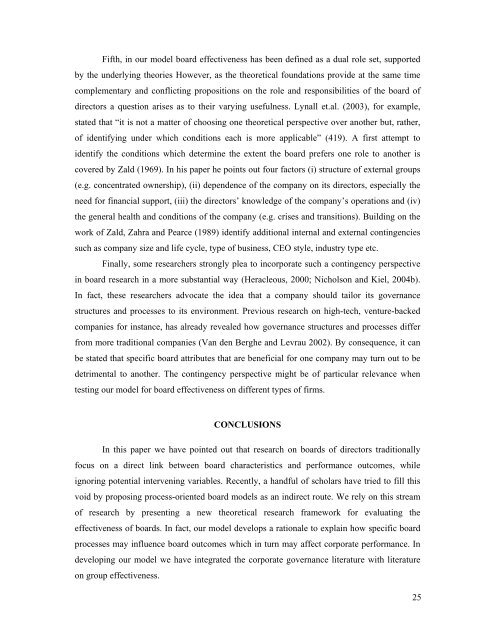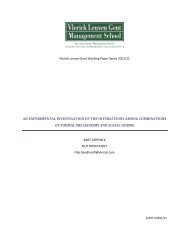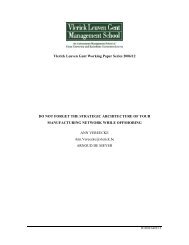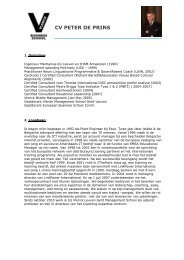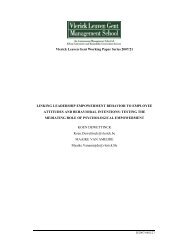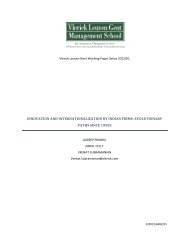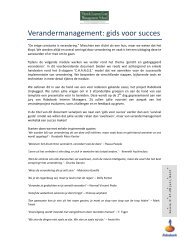Vlerick Leuven Gent Working Paper Series 2007/03 ... - Vlerick Public
Vlerick Leuven Gent Working Paper Series 2007/03 ... - Vlerick Public
Vlerick Leuven Gent Working Paper Series 2007/03 ... - Vlerick Public
Create successful ePaper yourself
Turn your PDF publications into a flip-book with our unique Google optimized e-Paper software.
Fifth, in our model board effectiveness has been defined as a dual role set, supported<br />
by the underlying theories However, as the theoretical foundations provide at the same time<br />
complementary and conflicting propositions on the role and responsibilities of the board of<br />
directors a question arises as to their varying usefulness. Lynall et.al. (20<strong>03</strong>), for example,<br />
stated that “it is not a matter of choosing one theoretical perspective over another but, rather,<br />
of identifying under which conditions each is more applicable” (419). A first attempt to<br />
identify the conditions which determine the extent the board prefers one role to another is<br />
covered by Zald (1969). In his paper he points out four factors (i) structure of external groups<br />
(e.g. concentrated ownership), (ii) dependence of the company on its directors, especially the<br />
need for financial support, (iii) the directors’ knowledge of the company’s operations and (iv)<br />
the general health and conditions of the company (e.g. crises and transitions). Building on the<br />
work of Zald, Zahra and Pearce (1989) identify additional internal and external contingencies<br />
such as company size and life cycle, type of business, CEO style, industry type etc.<br />
Finally, some researchers strongly plea to incorporate such a contingency perspective<br />
in board research in a more substantial way (Heracleous, 2000; Nicholson and Kiel, 2004b).<br />
In fact, these researchers advocate the idea that a company should tailor its governance<br />
structures and processes to its environment. Previous research on high-tech, venture-backed<br />
companies for instance, has already revealed how governance structures and processes differ<br />
from more traditional companies (Van den Berghe and Levrau 2002). By consequence, it can<br />
be stated that specific board attributes that are beneficial for one company may turn out to be<br />
detrimental to another. The contingency perspective might be of particular relevance when<br />
testing our model for board effectiveness on different types of firms.<br />
CONCLUSIONS<br />
In this paper we have pointed out that research on boards of directors traditionally<br />
focus on a direct link between board characteristics and performance outcomes, while<br />
ignoring potential intervening variables. Recently, a handful of scholars have tried to fill this<br />
void by proposing process-oriented board models as an indirect route. We rely on this stream<br />
of research by presenting a new theoretical research framework for evaluating the<br />
effectiveness of boards. In fact, our model develops a rationale to explain how specific board<br />
processes may influence board outcomes which in turn may affect corporate performance. In<br />
developing our model we have integrated the corporate governance literature with literature<br />
on group effectiveness.<br />
25


